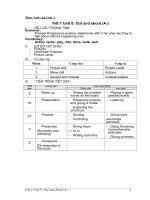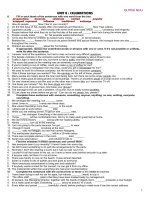Unit 8 (period 47-51)
Bạn đang xem bản rút gọn của tài liệu. Xem và tải ngay bản đầy đủ của tài liệu tại đây (171.68 KB, 9 trang )
Giáo án tiếng Anh 12 (bộ chuẩn)
Năm học: 2008 - 2009
Period: 47
Date of Teaching: 1.12.2008
Lesson: READING
A. WARM UP (5’)
- T prepares some handouts to stick to the board, then asks
the students to choose suitable sentences to fill in a chart.
eg: + higher living standard
+ more high buildings, more cars,
+ more fresh air.
+ more friendly people.
+ more dangerous diseases.
+ economics, technology, science, education, medical
systems are more developed.
+ labour - wasting
- T may ask some students:
+ How will the life be in the future?
B. PRE-READING (5’)
- Ask students to look at the picture, page 80 and ask:
What are the people going to do?
Does it look like a normal airplane?
How is it different?
Do you think that life in the future will be like this?
- Introduce the lesson
- Ask students to look at the questions in Before you read,
page 80, working in pairs to discuss the question in Before
you read:
1. Do you think life will be better in the future? Why/
Why not?
2. List three things that might happen in the future.
- Call a pair to report their discussion
C. WHILE-READING ( 25’)
Task 1
- T asks the sts to read the passage and then find the
suitable words to do task 1 in the textbook.
- T asks the students to work in pairs and compare the
answers with other pairs. Then T calls on the students to
A. WARM UP
- Work in groups to choose suitable sentences to fill in a chart.
Present Future
- labour wasting
- more fresh air
- more friendly people
- higher living standard
- more high buildings, more cars,
- more dangerous diseases.
- economics, technology, science,
education, medical systems are
more developed.
- Make conclusion: Life in the future is better
- Look at the picture and answer the questions:
They are going to fly.
No
It looks more modern than a normal airplane. It has no wings.
Yes,
No
Possible answers
S1: Do you think life will be better in the future?
S2: Yes
S1: Why?
S2: Because of the development of science and technology.
S1: List three things that might happen in the future
S2: I think in the future, people can live in the Mar, people will be
healthy without any diseases, and they can travel by plane to work
everyday.
C. WHILE-READING
- Students work in pairs.
Correct answers:
1. pessimists 4. terrorism
I. OBJECTIVES
By the end of the lesson, students will be able to :
* guess meaning from context.
* Decide on True or False statements.
* Read on comprehension.
* Take notes.
II. PREPARATION
- Textbooks, handouts, pictures
III. PROCEDURES
Giáo án tiếng Anh 12 (bộ chuẩn)
Năm học: 2008 - 2009
write the answers on the board.
- T checks and gives the correct answers.
Task 2
- T asks the students to read through the questions in the
textbook. Then asks them to underline key words/
sentences for each question.
( T may make the question 4 easier: eg: two factors that will
change our life? ( paragraph 3): Computers and
telecommunications)
- T asks the pairs to compare the answers. T may go around
to help them.
- Then T asks the student to go to the board and write their
answers.
- T corrects and gives the suggested answers.
Task 3
- T asks the students to read the passage again and do task
3.
- T asks the students to concentrate to the main information
in the paragraph/ sentences which appear words: Work and
Travel.
- T asks groups to compare the answers and then Tcalls on 4
groups to write their answers on the board
- T checks and gives the suggested answers
D. POST-READING (7’)
- T guides the students to discuss in groups about the
advantages and disadvantages of robots.
- T asks the groups to compare the answers.Then T calls on
each group to give the answers.
- T checks and corrects in front of the class.
- T may give some suggestions:
+ advantages: save labour, do difficult jobs so that men have
more time to enjoy life or do more creative work.
+disadvantages: replace human beings in many fields so
many people will lose their jobs or go jobless.
E. HOMEWORK (3’)
- Asks the students to learn new words by heart and write
what they think life in the future wil be.
F. COMMENT
2. optimists 5. wiped out
3. economic depression 6. space shuttle
. POST-READIN
- Work in pairs.
+ Read and answer the questions.
Suggested answers:
1. Many large corporations will be wiped out and millions of jobs will be
lost.
2. The security of the earth will be threatened by terrorism as terrorist
groups will become more powerful and more dangerous.
3. People will be living in much cleaner environment, breathing fresher
air and eating healthier foods. They will also be better looked after by a
mordern medical system. Domestic chores will no longer be a burden
thanks to the inventions of labour- saving devices.
4. They are developments in micro technology - computer and
telecommunication.G
- Work in groups.
suggested answer:
1. Work: factories will be run by robots, offices will go electronic, many
people will work from home.
2. Travel: travel by space shuttle will be very fast, at 15,000kph; cars
could run on electricity or methane gas and will be fitted with
computers. EOMEWORK F. COMMENTS
Period: 48
Date of Teaching: 2.12.2008
Lesson: SPEAKING
I. OBJECTIVES
By the end of the lesson, Students will be able to:
* talk about life in the future.
* discuss predictions about life in the future.
II. PREPARATION
Text books
Giáo án tiếng Anh 12 (bộ chuẩn)
Năm học: 2008 - 2009
A. WARM UP (5)
- T divides the class into 4 groups. T may give an example in front
of the class. (T can predict a person in the future).
eg: Mr Nam will have been ugly in the 2100 years.
Mr Nam will have lived in Mars in the 2100 years.
- Then T asks the sts to find the words/ verbs to fill into the
sentence: Mr Nam will have _____ in the 2100 years.
- The group which finishes the task first with the most correct
words/ verbs will be the winner.
B. PRE-SPEAKING (10)
- T pre- teaches some vocabulary:
+ declare open ( n.p): !"
+ a cure for: #$#%#
+ holiday resort ( n.p): &'()*
+ holiday maker (n.p): )+,'()*
+running on: #-!"./0!01#2
+ cold war: #3##4 56-7#3##4#6-"8#90
6-/: 5"2
- T guides the sts to pronouce these words correctly.
- T may call on some sts to check again and correct.
- T teaches and revises some structures like this:
* The future perfect tense:
- T may ask sts to give the form and use of this tense. Then T
writes them again on the board and asks sts to make some
sentences use this tense.
* It's likely that S + will have + p2..
It's unlikely that S + will have + p2....
eg: I think it's likely that robots will have taken over most jobs in
the factories in the future.
* It's too + adj .....
eg: It's too cold.
It's too far from the earth
C. WHILE-SPEAKING (20)
TASK 1
- T asks sts to look at the newspaper cuttings from the future
carefully and say what have happened by end of the 21st century.
First, T helps sts to make sure that they understand them clearly.
Then T writes a model on the board . Then T asks sts to underline
the key words/ phrases in the sentences. T may guide sts to read
the model sentence.
- T asks sts to work in pairs and sts look at the cues again to make
the similar sentences.
- T goes around the class to offer them.
- Sts compare their answers with the other pairs
- T calls on some sts to speak out their sentences in front of the
class.
- T feedbacks and corrects the mistakes.
TASK 2
- T asks sts to look at task 2 and give the predictions which are
likely / unlikely to happen in the future.
+ First, T explains some words in the table if sts don't understand
clearly.
+ Then asks sts to work in pairs and give two reasons for each.
A. WARM UP
- work in groups.
Suggested answers:
- been bald in the future.
- been the richest man .
- written books.
- built a university.
- Drill the pronuciation.
- Read in chorus and then read individually.
- Give the form and use of the future perfect tense.
+ use: We often use the future perfect tense to show that an
action will already be completed by a certain time in the future.
eg: I will have retired by the year 2020.
+ Form:
(+) S + will / shall + have + P2...
(-) S + will/ shall not + have + p2...
(?) Will/ Shall + S + have + p2...?
- Make the sentences.
C. WHILE-READING
- Work in pairs to make the ssentences after the model.
- Compair with the other pairs.
- Speak the sentences in front of the class.
Suggested answers:
- By the end of the 21st century, the third city on the moon will
have declared open.
- By the end of the 21st century, the new city on the moon will
have had a population of over 200,000 people.
-By the end of the 21st century, Scientists will have found a cure
for the common cold.POST-R
- work in pairs.
- compare with the others.
Suggested answers:
+ I think it's very likely that scientists will have found a cure for the
;
Giáo án tiếng Anh 12 (bộ chuẩn)
Năm học: 2008 - 2009
+ T may guide sts to use the structures:
* It's likely that S + will have + p2..
It's unlikely that S + will have + p2....
* It's too + adj .....
- T can write the model sentence on the board and underlined the
key words/ phrases for the sts.
- T may give some ways to speak
such as:
+ I think ...
+ In my opinion, ...
+ Thank to ...
+ By the end of ...
+ ... because living standards will have been improved.
- sts make their sentences and compare with the other pairs. (sts
can look at task 1 again)
- T calls some sts to speak out in front of the class.
- T checks and corrects the mistakes if yes.
D. POST-SPEAKING (8)
- T asks sts to make some predictions about what life will be like
one hundred years from now.
- T divides the class into 4 groups and gives sts limited time to
write the sentences (basing on the structures and contents of task
1,2). T goes around the class to offer them.
- T asks sts to share their ideas with the other groups.
- Then T may call a monitor of a group to present their sentences
in front of the class.
- T feedbacks and corrects them.
E. HOMEWORK (2)
- T asks sts to learn newwords and structures by hearts.
F. COMMENT
common cold by the end of the 21st century thanks to the
development of science and technology.
- In my opinion, it's unlikely that by the end of the 21st century
people will be living to the age of 150 because there will be more
nad more diseasses. EADING EOMEWORK F. CO
- Work in groups.
- Compare the sentences with other groups.
- Practice speaking freely MMENTS
Period: 49
Date of Teaching: 4.12.2008
Lesson: LISTENING
A. WARM UP (5)
- T makes some questions:
Eg:+ Do you want to have a long and healthy life?
- T asks to look at their books and choose the factors to have a
long and healthy life.
- T may ask the sts: What are you going to hear?
B. PRE-READING (5)
A. WARM UP
- Work in pairs to answer
Suggested answer:
+ eating healthy food.
+laughing a lot.
+ doing exercise.
+ going to bed early.
- guess and answer: People's life expectancy in the future.
<
I. OBJECTIVES
By the end of the lesson, students will be able to :
* Decide on True or False statements.
* Listen for details about people's life expectancy in the future.
II. PREPARATION
- Textbooks, handouts, tapescript, CD.
III. PROCEDURES
Giáo án tiếng Anh 12 (bộ chuẩn)
Năm học: 2008 - 2009
- Then T pre- teaches some newwords which appear in the
interview.
-T helps the students to pronounce these words correctly.
+ incredible (a): & = ,)>#
+ fatal (a) tai ha?7#4 )+
+centanarian ( n): )+@ A 50 B
+ eradicated (a): CD!
+ life expectancy ( n.p):
+ eternal life: :#E
+ percent : %
+ 15% = fifteen percent
- T may ask the sts to fill in the words into the sentences to make
sure sts understand the meaning and the use of these words.
- T may call on some students to read them again in front of the
class. Then T checks and corrects.
C. WHILE-READING (27)
TASK 1
- T asks the sts to look at task 1 and find newwords. T asks the sts
to listen to the tape and decide whether the statements are true
or false.
- T plays the tape 1st time.
- T plays the tape 2nd time.
- T plays the tape 3rd time.
- T tells the students to compare the answers with a friend. Then
T calls on the students to answer them on the board.
- T checks as the whole class and gives the correct answers.
TASK 2
- T asks the sts to correct the wrong information.
1. Today, providing we look after ourselves, eating unhealthily, cut
down on things likes butter, alcohol and vegetables.
2. The most important thing is the development in technology
science.
3. Nowadays, 15% of cancer can be curable. Cancer will also be
brought under control.
- T asks the sts to listen to the tape again and correct the
mistakes.
- T asks the sts to compare their answers with a friend.
- T calls on some sts to read aloud their answers in front of the
class.
- T checks the exercise in front of the class as a whole and gives
correct answers.
TASK 3
- T plays the tape again and asks the sts to answer the questions
independently. - T may help the sts to underline key words for
each question.
- T asks the pairs to compare the answers. T may go around to
help them.
- Then T asks the student to go to the board and write their
answers.
- T feedbacks and gives the suggested answers.
D. POST-READING (Time)
Drill pronunciation correctly.
- Read in chorus
- Read individual
- Fill in the words into the sentences.
C. WHILE-READING
. PO
- Students work in pairs.
- Read through 5 sentences and decided T or F.
- Listen carefully and decide.
Correct answers:
1. F
2. F
3. F
4. T
5. T
- Work in pairs.
Suggested answers:
1. healthily - cigarettes
2. medical
3. 50% - Aids
ST-READING
- Work in individual to read the questions, underline the key
words, listen and answer
- Work in groups to discuss and compare their answers..
Suggested answer:
1. Eating more healthily, cutting down on things like butter,
alcohol and cigarettes.
2. The development in medical science. Because nobody dies from
old age, just from diseases that affect people when they get older.
3. In ten years' time AIDS will also be brought under control./
We'll have been able to bring AIDS under control.
F









